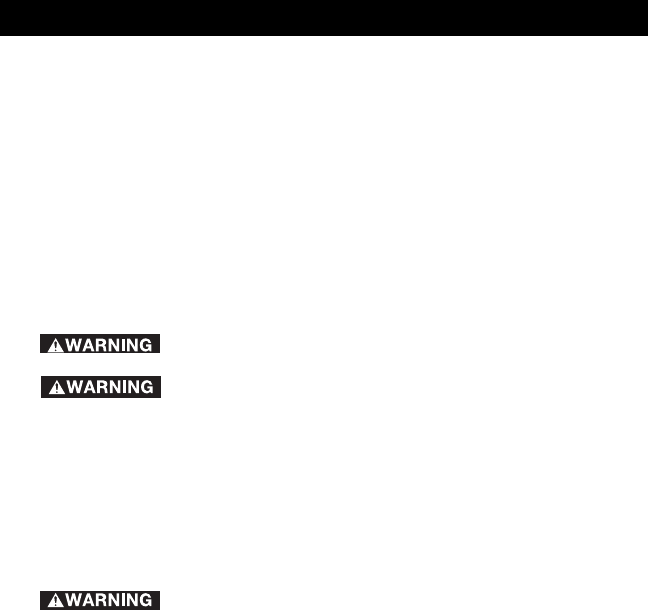
6
1. Hold tool by insulated gripping surfaces when performing an operation
where the cutting tool may contact hidden wiring or its own cord.
Contact with a “live” wire will make exposed metal parts of the tool “live” and
shock the operator.
2. Keep blades sharp. Sharp blades will do the job better and safer.
3. Keep hands away from cutting area. When sawing never reach underneath
or behind the material being cut for any reason.
4. When you have finished a cut be careful not to come into contact with the
blade. Turn off the motor immediately.
5. Make sure the material to be cut is firmly held to prevent movement.
6. Stay clear of end pieces that may fall after being cut off.
7. Never use a liquid coolant with portable band saws.
8. Liquid coolants can increase the risk of electric shock.
Use only stick wax to lubricate the blade.
9. EXERCISE EXTREME CAUTION WHEN BLIND CUTTING
TO BE CERTAIN THAT THERE ARE NO FOREIGN OBJECTS SUCH AS
ELECTRICAL WIRE, CONDUIT, PLUMBING PIPES, ETC., THAT MAY
COME INTO CONTACT WITH THE BLADE.
10. Never hold work in your hand, lap, or against other parts of your body when
sawing.
11. Wear eye and hearing protection. Always use safety glasses. Everyday
eyeglasses are NOT safety glasses. USE CERTIFIED SAFETY EQUIPMENT.
Eye protection equipment should comply with ANSI Z87.1 standards.
Hearing equipment should comply with ANSI S3.19 standards.
12. Use of this tool can generate and disburse dust or other
airborne particles, including wood dust, crystalline silica dust and
asbestos dust. Direct particles away from face and body. Always operate
tool in well ventilated area and provide for proper dust removal. Use dust
collection system wherever possible. Exposure to the dust may cause
serious and permanent respiratory or other injury, including silicosis (a
serious lung disease), cancer, and death. Avoid breathing the dust, and
avoid prolonged contact with dust. Allowing dust to get into your mouth or
eyes, or lay on your skin may promote absorption of harmful material.
Always use properly fitting NIOSH/OSHA approved respiratory protection
appropriate for the dust exposure, and wash exposed areas with soap and
water.
ADDITIONAL SPECIFIC SAFETY RULES
SAVE THESE INSTRUCTIONS!

















